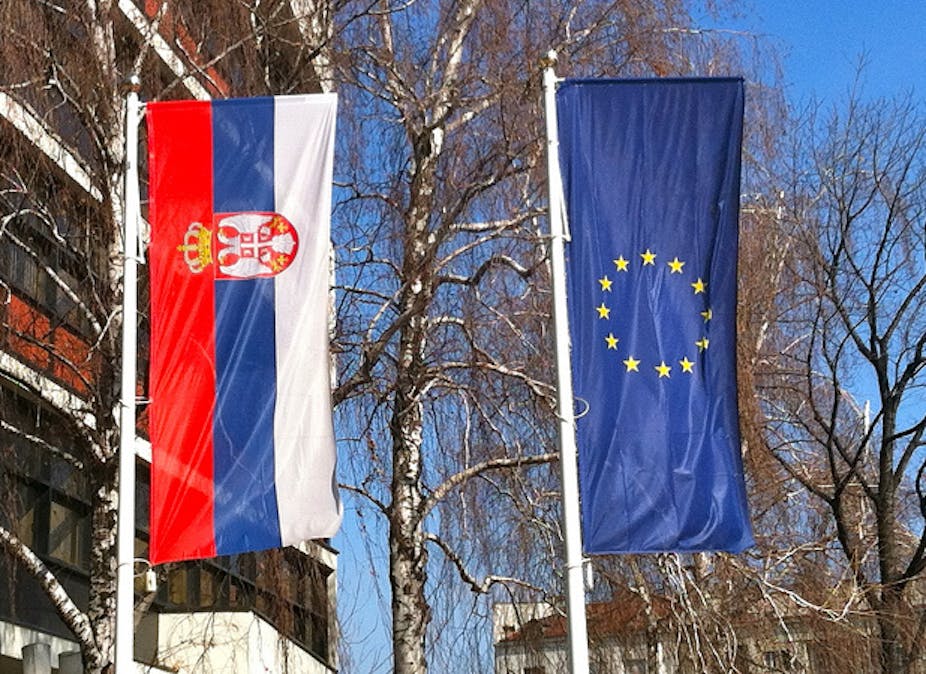After capturing 48% of the vote and 158 of the 250 seats in parliament at elections in March, the centre-right Serbian Progressive Party – led by first deputy prime minister Aleksandar Vučić – can form a government in its own right, no longer needing its Socialist Party partners.
It is the first time this has happened – as Vučić himself pointed out in his victory speech – since the late Slobodan Milošević’s Socialist Party of Serbia won Serbia’s first multi-party elections in 1990.
What are the key issues now for the Balkan nation? And is Serbia’s accession to the European Union now a mere fait accompli?
All roads lead to Brussels
Neither of the only two opposition parties – which jointly gained just 37 seats – oppose Vučić’s foreign policy or his neoliberal economic policies. Importantly, these have also been endorsed by the EU and the International Monetary Fund.
During the campaign, Vučić appeared to pin all hopes of economic recovery on investments from the United Arab Emirates. He claims to have personally secured the funds but they are yet to materialise. How those promised investments will tackle the intertwined problems of huge public and private debt and high unemployment has never been clarified.
Vučić and his main coalition partners of the past two years, the Socialists, took evident pride in securing Serbia’s candidate status for EU membership during their previous term and assured the country they would lead Serbia to accession. No parties opposing entry to the EU or advocating an alignment with Russia gained seats in the parliament.
Yet the Serbian people seem to be almost evenly split on the issue of accession to the EU. While an official poll in December showed 51% would vote yes on a hypothetical referendum on EU entry, only 38% of those polled thought Serbia would benefit from membership of the EU.
Meanwhile, 21% thought it would be beneficial and harmful in equal measure. The most optimistic estimates put Serbia’s entry date as 2020, which gives the Serbian people plenty of time to change their attitude towards EU membership.
While the much-touted economic benefits of membership – which at this stage are far from obvious – will factor in any debate in Serbia over EU accession, public opinion would fragment further if the EU required Serbia to officially to recognise Kosovo, which declared independence from Serbia in 2008.
The government has effectively recognised Kosovo Albanian institutions as legitimate and has urged the Serbs remaining in Kosovo to participate in them. Vučić played a key role in this policy shift. The Serbian electorate may not take very kindly to its leaders “giving up” on Kosovo – Serbia’s sacred heartland – but the incoming government will be well placed to extend official recognition and ride out any political storm.
EU officials have publicly praised Vučić and his colleagues as the most co-operative government in Serbia so far. With Vučić now prime minister-elect, they may yet continue to live up to this reputation.
A return to single-party rule?
Despite his policy toward EU integration, Vučić began his career with very different ideas. He first entered parliament at the age of 23, at the height of the Balkan wars of the 1990s, as a member of the nationalist Serbian Radical Party. The young politician spent the war years delivering fiery nationalist speeches in parliament and visiting Serb forces on the frontline.
Vučić witnessed Slobodan Milošević’s rise and fall first hand and evidently he was taking notes. From 1998 to 2000, he served as minister of information, overseeing a crackdown on journalists critical of the Milošević regime.
Vučić’s electoral campaign resembled Milošević’s campaigns in two main aspects: domination of the media and focus on a simple populist message. Vučić and his colleagues have maintained a constant presence across all media, so much so that one opposition party complained to the government broadcasting regulator about unbalanced media representation – and the regulator agreed.

Vučić’s message to voters was this: my party is the only one that can eradicate corruption in government and business. His government instigated the arrest and indictment of a number of former government officials and high-profile tycoons – all of them associated with the Progressives’ political rivals, the opposition Democratic Party, which was in power until 2012.
The highly publicised anti-corruption campaign has been used to paint the Democratic Party as the party of corruption and sleaze.
A challenging task
Although EU officials may consider Vučić and his government the best option they could have hoped for, it is far from clear what benefits his government will bring to the wider electorate. There is no evidence so far that the anti-corruption campaign has actually decreased corruption in business and government.
Unemployment in Serbia increased under the previous government. The official figure is 26%. In reality, it’s much higher.
In spite of this, Vučić has, thus far, proven to be more successful and cunning – and possibly more popular – than Milošević ever was. Not only has he sidelined domestic opposition, Vučić has also won the endorsement of the EU and the United States. Perhaps the best the nation can hope for is that Vučić’s policies will bring less damage to Serbia than Milošević’s did.

